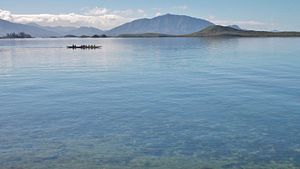On November 4, 2018, New Caledonia said “yes” to France. The Pacific territory should, therefore, remain French for a few more years, but according to the Noumea Accord, a new referendum should take place in 2020, and if, once again, the result is a “no” to independence, a last referendum could be organized in 2022. In this case, if Caledonians should vote a third time against independence, New Caledonia would then remain a French territory. Supporters of independence have not lost hope, and in light of the significant number of votes they achieved this time, New Caledonia’s independence is possible in a few years’ time.
A French possession since 1853, New Caledonia has been on the UN’s list of non-self-governing territories since 1986. The archipelago experienced strong interethnic tensions in the 1980s between the Kanak people (the indigenous Melanesian inhabitants) and the Caldoches (the European community), with the former pleading for independence. Following the bloody Ouvéa cave hostage-taking in 1988, the Matignon Agreements were signed, triggering a democratic process of sovereignty transfer. The principle of referendums was introduced by the Noumea Accord of 1998.
This long process testifies to the will of insular communities and France to initiate a peaceful transition and to avoid local tensions. However, this long and slow transition is at the origin of a certain immobilism in New Caledonia, whose political and economic life has focused for nearly 30 years on the island’s status. The recent referendum does not put an end to this transition, which may continue until at least 2022. This uncertainty has created a wait-and-see attitude on the part of foreign partners and investors, and thereby has not allowed the emergence of a consistent development policy.
The population of New Caledonia enjoys a high standard of living, well above the regional average, but nevertheless suffers from a high number of inequalities and faces many challenges including youth unemployment (nearly 36 percent of young people are unemployed), a high cost of living because of imports, and economic dependence on a single resource, nickel. The island has the world’s second-largest reserves of nickel and the mineral accounts for nearly 90 percent of its exports.
Whether New Caledonia remains French while enjoying broad autonomy or becomes independent, the Noumea Accord can’t cut corners on greater regional integration. New Caledonia will have to define its own development strategy and strengthen its relations with other Pacific islands as well as with major regional powers like China, Australia, and Japan.
Since 1990, FLNKS (Front de Libération Nationale Kanak et Socialiste, or the Kanak and Socialist National Liberation Front), the main Kanak political movement, has been a member of the Melanesian Spearhead Group (MSG), which includes several states in Melanesia. New Caledonia also belongs to several regional and international organizations such as the Pacific Islands Forum (PIF). The next issue for New Caledonia will be to assert itself in the international community in order to become more attractive to foreign investors.
However, New Caledonia should not leave France behind. New Caledonia remains a strategic point for France in the Pacific region. The French army maintains a presence there, and thanks to New Caledonia, France has full legitimacy to define itself as a Pacific power and is thus a member of the Pacific Community (SPC), which is situated in Noumea. Because of its many overseas territories, France has the second-largest exclusive economic zone worldwide after the United States. The French president, Emmanuel Macron, announced in May 2018 that Paris was working with New Delhi and Canberra on a strategic axis for the Indo-Pacific zone and aimed indirectly at China. For New Caledonia, this French presence, through its economic transfers (which represent nearly 15 percent of the archipelago’s GDP) ensures a certain stability and shelters it from the growing competition between Australia and China in the Pacific region.
But despite Paris’ intentions, France is losing its stake in New Caledonia. It is no longer New Caledonia’s largest trading partner, having been supplanted since 2016 by China. More than 50 percent of New Caledonia’s exports (almost exclusively nickel) are destined for China. In addition, Chinese companies are interested in mining nickel in New Caledonia, but one of Noumea’s challenges will be attracting investors to other sectors in order to diversify its economy.
Unlike French Polynesia, and despite its cultural and natural heritage, New Caledonia has long been a marginal tourist destination, and the number of visitors to the island had stagnated at around 100,000 per year before crossing the 120,000 mark in 2018, the result of a policy based mainly on nickel extraction since the 1980s. The composition of tourists visiting New Caledonia is changing. While French nationals are still the most-represented (close to 44 percent of tourists in 2016), New Caledonia’s tourism sector draws its current growth from visitors from Australia, Japan, and New Zealand. Noumea also seeks to attract Chinese customers. In 2018, New Caledonia received its first Chinese tourists, who arrived on charter flights, and the hope is that Chinese clientele will reach 9,000 visitors by 2025, a figure that remains relatively low. However, in order to achieve this goal, New Caledonia will have to find the right investors to offer regular direct flights from Chinese cities.
New Caledonia must now consider the actions to be taken in order to define its relations with China, Australia, and other world powers. New Caledonia has four years before its third and final independence referendum; in the next few years, New Caledonian government entrepreneurs must increase contacts with their foreign counterparts and promote the assets of their island. Above all, they must define a consistent strategy for their future relations with China, Australia, and other powers to prevent being caught off guard if, one day, New Caledonia does become independent.
Sebastien Goulard is a public affairs consultant. He works for projects related to EU-China relations and the Belt and Road Initiative.

































